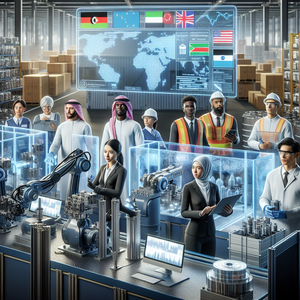
Navigating Tariff Pressures: The MedTech and Healthcare Careers Driving Innovation and Resilience
The medtech and healthcare industries are currently navigating uncharted waters due to the ripple effects of evolving global tariffs on medical devices and related products. These tariffs have created a complex web of challenges, including rising costs, constrained R&D budgets, and disrupted supply chains. Healthcare companies, already operating within tight margins, now face even greater financial pressure, potentially increasing costs for payers and patients alike. To mitigate these impacts, organizations are leaning on skilled professionals to chart a path forward, ensuring resilience and innovation despite the hurdles.
Job Summaries:
Supply Chain Manager:
- Supply chain managers are at the forefront of combating the logistical challenges caused by tariffs.
- Tasked with maintaining a steady flow of critical medical devices and supplies, these professionals develop strategies to offset rising costs, secure alternative suppliers, and implement contingency plans.
- For example, during a recent tariff hike, a major hospital system successfully mitigated disruptions by sourcing materials from domestic manufacturers under the guidance of its supply chain team.
- Key qualifications include a bachelor’s degree in supply chain management or business administration, along with expertise in data analytics and strategic planning.
Regulatory Affairs Specialist:
- Navigating international trade regulations and tariff requirements.
- Securing compliance certifications.
- Managing import/export processes.
- Liaising with regulators to minimize financial risks.
- Securing tariff exemptions for innovative surgical tools.
- Saving companies millions while maintaining global market access.
- Requiring a degree in life sciences or regulatory affairs.
- Deep understanding of FDA and international regulatory standards.
Medical Device Product Manager:
- Product managers in medtech face the difficult task of balancing innovation with cost-efficiency.
- Tariffs have driven up production costs, prompting these professionals to explore alternative materials and redesign products to minimize expenses.
- For example, a product manager might spearhead the development of a device using locally sourced components, reducing exposure to import tariffs while maintaining functionality and compliance.
- A background in engineering, business, or marketing, coupled with exceptional communication skills, is essential for this role.
R&D Manager:
- Research and development managers are tasked with maintaining a steady pipeline of innovative products despite tighter budgets.
- By prioritizing initiatives, exploring cost-effective materials, and leveraging emerging technologies like 3D printing, R&D managers can sustain progress while minimizing financial strain.
- One notable example is a medtech company that reduced its prototyping costs by 40% through the adoption of advanced additive manufacturing techniques.
- A master’s or Ph.D. in biomedical engineering or a related field, combined with project management expertise, is typically required for this role.
Healthcare Cost Analyst:
- Healthcare cost analysts play a crucial role in quantifying the financial impact of tariffs and identifying areas for cost optimization.
- By analyzing supplier contracts and evaluating the feasibility of alternative sourcing options, these professionals help organizations make data-driven decisions to control expenses.
- For instance, a cost analyst might recommend a transition to domestically manufactured devices to save on tariff-related fees.
- A background in economics, finance, or healthcare administration, along with proficiency in analytics tools, is key for this position.
Trade Compliance Specialist:
- Trade compliance specialists ensure that medtech companies remain compliant with international trade laws and tariff regulations.
- These professionals monitor changes in trade agreements, prepare customs documentation, and manage strategies to mitigate financial risks.
- For example, a trade compliance specialist recently helped a company secure duty refunds on imported goods, recovering significant costs.
- A degree in international business or law is often required, and certifications like Certified Customs Specialist (CCS) can enhance career prospects.
Procurement Manager:
- Procurement managers are pivotal in negotiating supplier contracts to offset the impact of tariffs.
- They evaluate supplier reliability, explore sourcing alternatives, and secure competitive pricing to manage costs effectively.
- For instance, a leading healthcare organization saved millions by establishing partnerships with suppliers in countries exempt from tariffs.
- Candidates for this role typically hold degrees in supply chain management, purchasing, or business, and possess strong negotiation skills.
Medical Economist:
- Medical economists analyze the broader economic implications of tariffs on healthcare delivery, including impacts on insurance premiums and patient access.
- Their research often informs policymaking and industry strategies.
- A recent study by a medical economist demonstrated how tariff exemptions on life-saving devices could reduce overall healthcare costs by 15%.
- A degree in economics or public health, paired with advanced quantitative analysis skills, is essential for this impactful career.
Biomedical Engineer:
- Biomedical engineers are critical in designing cost-effective, compliant medical devices.
- These professionals often respond to tariffs by exploring alternative materials and innovative manufacturing techniques.
- For instance, a biomedical engineer may develop a device using biodegradable, domestically sourced materials to avoid import tariffs.
- This role requires a degree in biomedical engineering and expertise in CAD software for designing cutting-edge solutions.
Policy Analyst:
- Policy analysts evaluate the effects of tariffs on the medtech industry and advocate for legislative changes to support innovation and healthcare access.
- A recent lobbying effort led by policy analysts successfully secured tariff exemptions for a class of durable medical equipment, reducing costs for hospitals nationwide.
- A degree in public policy or political science, combined with strong research and communication skills, is essential for this role.
As tariffs reshape the medtech and healthcare landscape, the demand for skilled professionals who can navigate these complexities is rising. By pursuing careers in these critical roles, you not only position yourself for success but also contribute to safeguarding healthcare access and innovation. Now is the time to take action—explore these opportunities and help shape the future of healthcare delivery in a rapidly changing world.
Explore More Jobs

